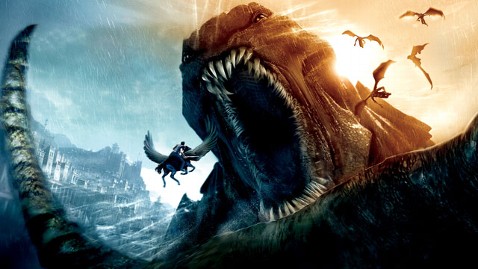A ‘Kraken’ in the Ancient Seas?

A kraken in a poster for the 2011 film "Clash of the Titans." Legendary Pictures
Oceanographers will tell you there is no such thing as a kraken. It is the stuff of myth, an ancient sea monster conjured up by Norse sailors in the 13th century and included in a zillion movies. There is no direct evidence that one ever existed.
Except that now, to describe a possible predator in a long-ago sea 215 million years ago, paleontologist Mark McMenamin of Mount Holyoke College in Massachusetts and his wife Dianne have used the term “Triassic Kraken.” Reporters are having tremendous fun with the story, and Google tells us people have been searching for the word “kraken” all day.
In a presentation at the Geological Society of America meeting in Minneapolis, McMenamin said he had an explanation for the fossilized skeletons of nine shonisaurs, early undersea dinosaurs found in what is now Nevada. They’re roughly aligned side by side. They are believed to have been predators. How did they die? The McMenamins say there’s no fossil evidence but write this in their abstract:
“We hypothesize that the shonisaurs were killed and carried to the site by an enormous Triassic cephalopod, a ‘kraken,’ with estimated length of approximately 30 m [100 feet], twice that of the modern Colossal Squid Mesonychoteuthis. In this scenario, shonisaurs were ambushed by a Triassic kraken, drowned, and dumped on a midden like that of a modern octopus.”
(A cephalopod is any member of a class of mollusk that includes the squid, cuttlefish and octopus.)
“We all love a good story,” writes Sarah Simpson at Discovery News. “But when you start hearing from scientists that those same sea monsters were expressing themselves artistically … it may be time for journalists to question the difference between a good story and solid science.”
PZ Myers, a much-followed blogger and professor at the University of Minnesota in Morris, is not at all amused.
“I love the idea of ancient giant cephalopods,” says Myers. “But then reality sinks in: That’s a genuinely, flamboyantly extravagant claim, and the evidence better be really, really solid. And it’s not. It’s actually rather pathetic.”
“Let me explain something here,” he writes. “This ‘Triassic kraken’ has not been found; no fossils, no remains at all, no evidence of its existence.”
Still, thousands of people are searching for the word “kraken” today. As Simpson said, we all love a good story.